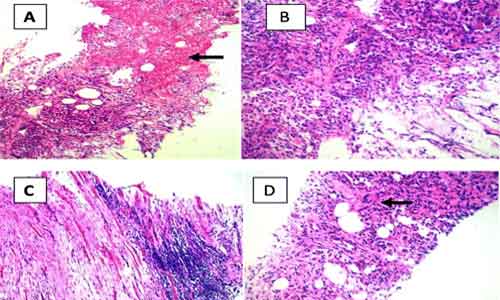- Home
- Editorial
- News
- Practice Guidelines
- Anesthesiology Guidelines
- Cancer Guidelines
- Cardiac Sciences Guidelines
- Critical Care Guidelines
- Dentistry Guidelines
- Dermatology Guidelines
- Diabetes and Endo Guidelines
- Diagnostics Guidelines
- ENT Guidelines
- Featured Practice Guidelines
- Gastroenterology Guidelines
- Geriatrics Guidelines
- Medicine Guidelines
- Nephrology Guidelines
- Neurosciences Guidelines
- Obs and Gynae Guidelines
- Ophthalmology Guidelines
- Orthopaedics Guidelines
- Paediatrics Guidelines
- Psychiatry Guidelines
- Pulmonology Guidelines
- Radiology Guidelines
- Surgery Guidelines
- Urology Guidelines
Proper sleep for 7 hours may help treat Pulmonary Fibrosis, finds study

Pulmonary Fibrosis is an incurable disease that kills about 5,000 people, a year in the U.K.The circadian clock plays an essential role in energy metabolism and inflammation. In addition, pulmonary inflammatory responses lie under circadian control. A new study explores the relationship of sleep duration with Pulmonary Fibrosis.
Researchers have discovered that people who regularly sleep for more than 11 hours or less than 4 hours are 2-3 times more likely to have pulmonary fibrosis, compared to those that sleep for 7 hours in a day. They attribute this association to the body clock and therefore targeting the body clock reduces fibrosis in vitro. The study is published in Proceedings of the National Academy of Sciences.
Our internal body clocks regulate nearly every cell in the human body, driving 24-hour cycles in many processes such as sleeping, hormone secretion, and metabolism.
In the lungs, the clock is mainly located in the main air carrying passages—the airways. However, the team discovered that in people with lung fibrosis, these clock oscillations extend out to the small air spaces, called alveoli.
Studies in mice revealed that by altering the clock mechanism it was possible to disrupt the fibrotic process making the animals more likely to develop pulmonary fibrosis.
The researchers then showed that pulmonary fibrosis is associated with short and long sleep duration using human data from the UK Biobank.
The link between sleep duration and lung fibrosis is similar in strength to other known risk factors for this disease.
People who report they regularly sleep 4 hours or less in a day doubled their chance of having pulmonary fibrosis while those sleeping 11 hours or longer in a day tripled their chance of having the disease, compared to those sleeping 7 hours per day.
Smaller, but still elevated, risks were also seen in people who like to stay up late at night or those who do shift work.
The researchers explain their findings by the discovery that a core clock protein (REVERBα) which alters the production of a key protein in lung fibrosis (collagen).
This is an exciting finding, they say because chemical compounds can alter the function of REVERBα.
The authors were able to show that one of these REVERBα compounds can reduce collagen in lung slices from people with this disease.
Dr John Blaikley from The University of Manchester, who led the project said: "Pulmonary fibrosis is a devastating condition which is incurable at present. Therefore, the discovery that the body clock is potentially a key player potentially opens new ways to treat or prevent the condition. More work will need to be done around studying the association between pulmonary fibrosis and sleep duration to establish both causation and reproducibility. If these results are confirmed, then sleeping for the optimal time may reduce the impact of this devastating disease."
Dr Peter Cunningham, the joint lead author on the paper, said: "It is fascinating to think that clock activity is increased in fibrotic disease. Previous studies have shown that the clock also plays an important role in infection, cancer and diabetes. The discovery that the clock plays a role in fibrosis suggests that altering these oscillations could become an important therapeutic approach."
For more details click on the link: DOI: 10.1073/pnas.1912109117

Disclaimer: This site is primarily intended for healthcare professionals. Any content/information on this website does not replace the advice of medical and/or health professionals and should not be construed as medical/diagnostic advice/endorsement or prescription. Use of this site is subject to our terms of use, privacy policy, advertisement policy. © 2020 Minerva Medical Treatment Pvt Ltd